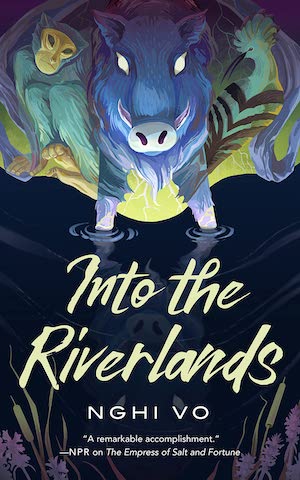Poor Ponder. He doesn’t deserve this.
Summary
Mrs. Whitlow is sitting at the table eating alone (because she couldn’t possibly eat with the wizards and get above her station), and the Librarian notices something strange about the island. He tries to tell the wizards, but sneezes and becomes a shell. Ponder figures it out—the island only has one of every thing in produces, which means that nothing can reproduce. A giant reptilian creature appears, and the wizards prepare to throw fireballs at it, but it is suddenly compressed into the size of a grapefruit, and no one knows how. Rincewind finds a road and then a strange armored cart being pulled by many horses. He flags it down and finds it’s being driven by a dwarf called Mad, who tells him to get into the cart and fire his crossbow, as he’s being pursued by other carts, one that’s being pulled by an emu. Rincewind loses his hat, and one of the approaching drivers has it. When he tells the man to give it back, the man suggests that the wizard do some magic on him… then suddenly turns green and keels over, leading to a pile-up and destroying the whole group of pursuers. Mad grabs up their hay and oats, and plans to sell their weapons. Rincewind takes up his hat, uncertain of why the man dropped dead. Ponder thinks about evolution and his own annoyance with his colleagues while they’re asleep and suddenly hits upon what else is wrong with the island.
Buy the Book


Into the Riverlands
While Ponder explains to Ridcully that he can’t see any familiar constellations, Rincewind is talking to Mad about how it never rains on this continent, and also how the dwarf’s family got shipwrecked there years ago. Ponder tells the wizards that they’ve traveled back in time thousands of years, and then explains the grandfather paradox to them… which turns out to be a mistake that results in having a very long side conversation about fratricide and ants, and ends with Ridcully deciding that anything they do in the past has already happened, so no one needs to worry about it. The god of the island observes the wizards sleeping and tries to think what to do about them, creating a new plant. Rincewind and Mad enter Dijabringabeeralong, a town with a street and a pub run by a crocodile they call Dongo. Rincewind gets promptly trashed on their beer and accidentally calls the bar’s patrons into question and admits where he’s from. He’s about to get beaten up by a wombat named Wally when Mad comes to his aid with his crossbow. The wizards have built a boat (that is just a log), and tell Ridcully that they plan to use the Bursar to test it. The Bursar, in the meantime, is wandering around stepping on ants (in case they turn out to be related to Ridcully), and comes across a strange new plant.
Rincewind wakes up to Scrappy the kangaroo again and tells him that he’s still not going to do what the kangaroo wants. He’s headed to Bugarup to find a ship and sail home. The wizards find the Bursar, who came across the plant that the god made, which is a pumpkin that has formed itself into a sort of ship. Ridcully finds its appearance far too convenient (even more than all the food and cigarettes) and decides that he’s not falling for it and wants to know what’s going on. This causes the god to appear before them, though he accidentally turns out very short. He threatens to smite them, but then calls it off and admits he’s a bit of an atheist. He explains how he used to be a regular god who pretended to smite, and then all his followers were killed by followers of another god in the next valley. So the god thought it would be good if creatures could change their own instructions, and has been trying to trigger that in living things, only it’s not turning out well. Ponder realizes that this is the god of evolution, which he finds difficult since evolution happens in the world anyway. Ridcully suggests that having two gods of evolution might be good, then you could see who’s best at it and wins. That seems to set the god on something and he disappears. Ridcully decides with all that information that they should load up the boat with as much food as possible and get off the island.
Ponder is beside himself at the idea that they would leave now that they have an opportunity to observe evolution and its possible development, but Ridcully is adamant about getting a move on now. Rincewind comes to and finds that Scrappy is gone, and Dongo fills him in about how drunk he was last night and all the wild betting he got up to, and how many folks bought him drinks. The Luggage is lost in space-time on account of Rincewind’s movements, and gets picked up by Petunia, The Desert Princess. While drunk, Rincewind made a bet about how well he could shear sheep, so finds himself with Daggy and a bunch of sheep to shear per their terms. The other shearers gather and note that he’s awfully slow at the job, which was not what he promised. A ram suddenly shows up. It’s not one of Daggy’s and the group insist that Rincewind be the one to shear it. The ram speaks to Rincewind and tells him that it’ll help him get the job done, and Rincewind finds himself shearing thirty sheep in two minutes—he’s won the bet. The fellows don’t have money to pay him, but Rincewind just wants to know the way to Bugarup, and they give him a horse to take him… one that Daggy has had for ages, or so he believes. The wizards are getting ready to sail and realize that Ponder has gone missing, so they set out to look for him.
Commentary
So here’s where we get a little bit bogged down in movie parodies, from Mad Max to Crocodile Dundee, which is fun for a chuckle, but a little odd to spend quite so much time on. I do think that while he’s leaning on the better known films, there’s a bit of Tank Girl ancestry in here too, with all the talking anthropomorphized animals that resemble the Rippers a bit. If Tank Girl isn’t being referenced in here, it really should be, since the movie came out three years before this book and also takes place in apocalypse-Australia.
Not enough women around to sell that parody, though, which is unfortunate to my mind—and that does seem genuinely a little out of whack in this book. Obviously, there’s reason for it in the wizard sections, but it doesn’t make sense that Rincewind is only running into men thus far on XXXX. The only reason it seems to be shaking out that way is due to the parody aspect, which just shows one way in which parody can fall flat when building story. If only he’d written this book after Fury Road had come out, maybe the Mad character would’ve been based on Furiosa, which would’ve been amazing.
Of course, we’re coming up on more The Adventures of Priscilla, Queen of the Desert bits, which is a film I haven’t watched in ages and should probably jog my memory on before the second half of the book.
Also again with the spider mentions, I really don’t need to be thinking about that every time I have to use the toilet, like I’ve always wanted to visit Australia, but the cost might be too high, is what I’m saying.
The bits with the wizards trying to work their way through the grandfather paradox and closed loop theory and evolution are mostly fun for watching Ponder’s brain slowly leak out his ears for the curse of being the only wizard who is somewhat science-minded. It’s strange to go down this particular well directly after Jingo, however; we just got a whole book that dealt with the concept of alternate timelines, with Vimes picking up the dis-organizer and hearing the version of events that he didn’t choose, so immediately crossing into time travel paradoxes that aren’t Pratchett’s own “trouser legs of time” read on things is a weird way to go.
The discussions of what the wizards might listen to while stuck on a desert island is obviously a question people love to ask, and also the subject of a BBC radio show called Desert Island Discs, which Pratchett actually gave his own list for in 1997 (the year before this book was published, which might be why it was on the brain for him). He chose some solid older classical numbers (Vivaldi; The Marriage of Figaro), but my favorite of his picks include Meatloaf’s “Bat out of Hell,” Icehouse’s “Great Southern Land,” Kitarō’s “Silk Road Theme,” and Steeleye Span’s “Thomas the Rhymer.”
Please don’t ask me to do this, though, picking only ten songs would be impossible. Even ten full albums. How… how do people do things like this, I would need a different list for every mood and different weather and times of day.
Asides and little thoughts:
- “I can’t help thinking you’re working up to some sort of horrible joke about a poop deck. I’d prefer not, if it’s all the same to you.” is a great way of getting out of having to make a poop deck joke, and I’m dead impressed by it.
- Look, it’s objectively true that “no worries” is a magical phrase, and that once you start using it, it’s very difficult to stop, to the point where you start to get nervous that you sound too flippant about everything.
- The footnote about Mrs Whitlow applying the term savages not to “suggest that the subjects have a rich oral tradition, a complex system of tribal right and a deep respect for the spirits of their ancestors” but “implying the kind of behavior more general associated, oddly enough, with people wearing a full suit of clothes, often with the same sort of insignia” is… well, it’s savage, darling.
Pratchettisms:
The Dean glanced at the housekeeper, who was daintily eating a banana, a feat which is quite hard to do.
In accordance with ancient narrative practice, the shot ricocheted off someone’s helmet and brought down an innocent bird some distance away, whose only role was to expire with a suitably humorous squawk.
“You don’t get proper fill-in-nouns these days—remember old ‘nickname’ ancient-wizard-who-died-fifty-years-ago-who-Ponder-wouldn’t-possibly-be-able-to-remember? Now there was a chap who knew his fill-in-nouns.”
Ponder struggled to find a crack in his Archchancellor’s brain into which could be inserted the crowbar of understanding, and for a few vain seconds thought he had found one.
He couldn’t raise the subject with Crocodile Dongo. There was a philosophical wrongness about drawing a crocodile’s attention to the fact that there were a couple of kangaroos in the bar.
Boils didn’t hold much of a menace when rogue demons had wanted to rip your head off and do terrible things down the hole.
Rincewind gave Daggy what he hoped was the smile of one craftsman to another, but smiling at Daggy was like throwing meringues against a cliff.
Large, pink and very clean, she relaxed by the water like an amplified siren.
Next week we’ll read to
And, for some reason, it was getting taller.










